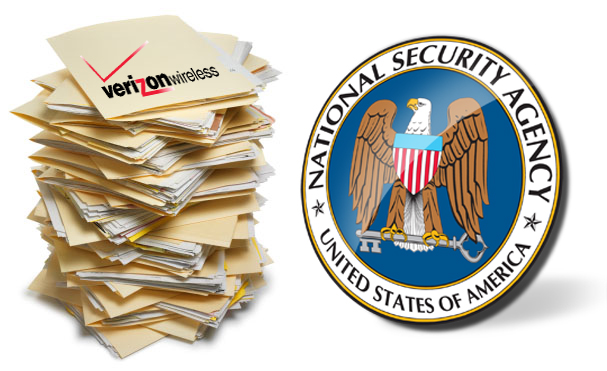UPDATE 9:20PM: The Washington Post reports tonight that U.S. intelligence agencies have also extracted e-mail, audio and video chats, photos and other private communications from the servers of nine major firms, including Apple, Google, Microsoft, Yahoo, Skype, and Facebook. Most companies say they had no knowledge of the program, code named PRISM, collecting their information. Though Google stated that it tried to resist the FBI's demands for user data earlier this year, but the FBI took it anyway.
Big news today in the mobile security world. If you're a Verizon customer, it turns out your smartphone data isn't quite as private as you think it is, at least from the government. Reports were confirmed early this morning that a “secret court” has given the the U.S. National Security Agency (NSA) full access to millions of phone records from Verizon customers.
 And that doesn't mean sporatic data provided upon request either. On April 25th, the U.S. Foreign Intelligence Surveillance Court ruled in secret that Verizon would be required to provide all call records, or “telephony metadata”, to the NSA on an ongoing, daily basis, regardless of whether specific individuals were suspected of any wrongdoing. The logs not only include time and duration of calls, but source and receiver phone numbers, location of calls made both within the U.S. and between the U.S. and other countries, calling card numbers, and other “unique identifiers” that the Verizon keeps to keep tabs on you.
And that doesn't mean sporatic data provided upon request either. On April 25th, the U.S. Foreign Intelligence Surveillance Court ruled in secret that Verizon would be required to provide all call records, or “telephony metadata”, to the NSA on an ongoing, daily basis, regardless of whether specific individuals were suspected of any wrongdoing. The logs not only include time and duration of calls, but source and receiver phone numbers, location of calls made both within the U.S. and between the U.S. and other countries, calling card numbers, and other “unique identifiers” that the Verizon keeps to keep tabs on you.
Verizon has declined to speak further on the matter, which has no doubt left customers – and all mobile users – with even more questions. After all, there's no guarantee that Verizon was the only mobile carrier affected by the ruling. And this morning, an unnamed top White House official made no excuses for the NSA bullying carriers into handing over their customer information, stating that collecting phone record data was “a critical tool in protecting the nation from terrorist threats.
So is actual phone tapping going on as well? The official, who spoke on the condition anonymity, went on to claim that “the order reprinted in the article does not allow the government to listen in on anyone's telephone calls.” Ahh, got it. So now we can breathe easy …right?





